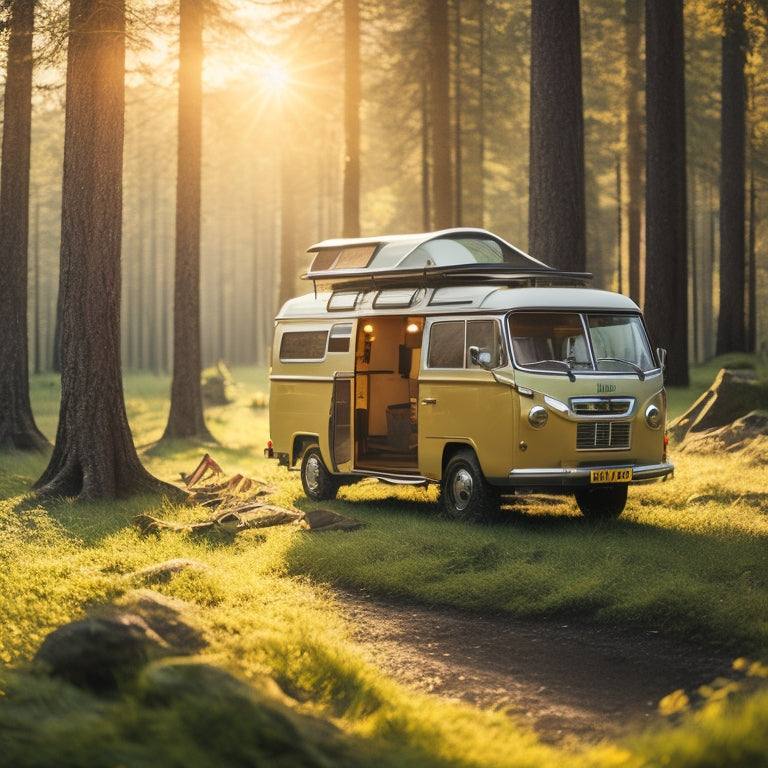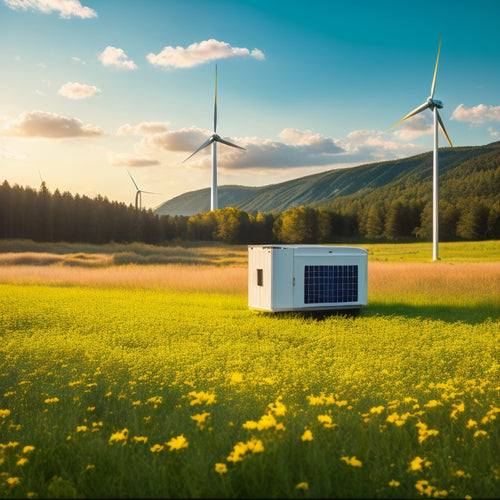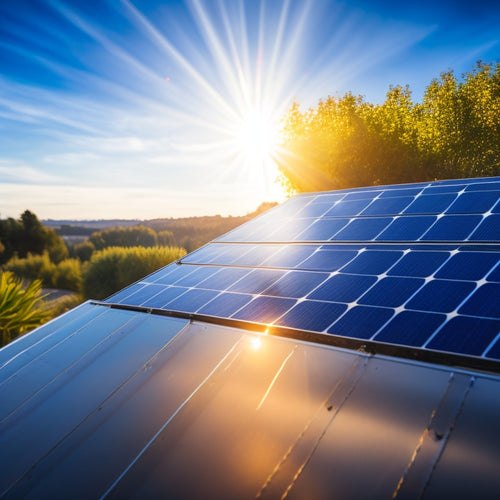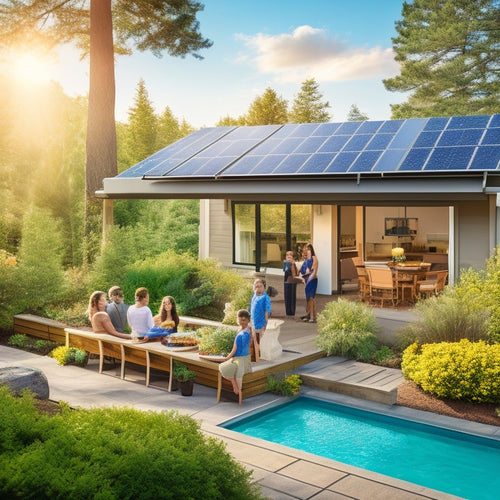
10 Essential Tips for Solar Powered Adventures
Share
As you prepare for your next solar-powered adventure, careful planning and attention to detail are essential to ensuring a seamless and energy-efficient experience. You'll want to pack the right gear, choosing high-efficiency solar panels and optimizing your battery life. Select the right inverter size, and don't forget essential camping gear like portable power options and solar backpacks. Stay safe with surge protectors and regular inspections, and explore solar cooking and water purification options. By following these essential tips, you'll be well on your way to a successful solar-powered adventure. Now, discover the finer details to take your adventure to the next level.
Key Takeaways
• Prioritize high-efficiency solar panels with ratings above 20% for optimal energy yield and consider certifications like IEC and UL.
• Inspect and maintain batteries regularly, ensuring clean terminals, adequate electrolyte levels, and monitoring cycle counts and depth of discharge.
• Calculate power demands for appliances, oversize inverters by 10-20%, and balance power needs with inverter capacity to avoid unexpected power spikes.
• Invest in portable power options like solar backpacks and power hubs, and choose high-quality batteries for efficient energy storage and camping needs.
• Regularly inspect and maintain the entire solar system, addressing potential issues early, and protecting solar panels from weather damage and electrical surges.
Packing the Right Solar Gear
When venturing into the great outdoors, you'll want to pack the right solar gear to keep your devices charged and your adventure uninterrupted. A critical step in preparing for your solar-powered adventure is creating a thorough gear checklist. This guarantees you don't forget essential items like solar panels, batteries, and charging cables.
Consider the duration of your trip, the devices you need to charge, and the amount of sunlight you'll receive to determine the right gear for your needs.
Effective packing strategies are also essential to a successful solar-powered adventure. Pack your gear in a way that protects it from the elements and makes it easily accessible. Consider using waterproof bags or cases to shield your gear from moisture and dust.
Additionally, organize your gear in a logical order, so you can quickly find what you need when you need it. By prioritizing gear checklists and packing strategies, you'll be well-prepared for an uninterrupted and enjoyable solar-powered adventure.
Choosing the Best Solar Panels
When selecting the top solar panels for your adventure, you'll want to take into account a few key factors.
First, you'll need to contemplate panel efficiency ratings, which can greatly impact how much power you can generate.
You'll also want to explore portable panel options, which can be a game-changer for on-the-go adventures.
Panel Efficiency Ratings
You'll want to prioritize high-efficiency solar panels, as they convert a greater percentage of sunlight into usable energy, giving you more power per hour of sunlight. This is especially important for solar-powered adventures, where you may not have the luxury of waiting around for your batteries to charge. Look for panels with high efficiency ratings, typically above 20%. These will give you more bang for your buck, so to speak.
When researching solar panels, you'll come across various certifications, such as IEC and UL. These certifications guarantee the panels meet certain standards for performance and safety. Additionally, consider the energy yields of different panels. Some panels may have higher energy yields due to their ability to harness energy at lower light levels or in hot temperatures.
Portable Panel Options
For your solar-powered adventure, consider portable solar panels that are designed to be compact, lightweight, and durable, making them easy to transport and set up in the great outdoors. These panels are perfect for off-grid adventures, where you need a reliable source of energy to keep your gear charged.
When choosing a portable solar panel, look for a foldable design that allows you to easily pack it up and take it with you. This feature is especially useful when you're hiking or backpacking to your campsite. Additionally, consider panels with waterproof frames, which guarantee that your panel can withstand rough weather conditions.
Some popular portable solar panel options include flexible panels, solar blankets, and compact solar chargers. These options are designed to be versatile and adaptable, making them perfect for any outdoor adventure.
Boosting Solar Battery Life
Maximize your off-grid adventures by taking steps to boost your solar battery's lifespan, which can be greatly shortened by improper maintenance and charging habits. Proper battery maintenance is vital to extend its lifespan.
You should regularly inspect your battery for signs of wear, corrosion, or physical damage. Guarantee terminals are clean and secure, and electrolyte levels are adequate. Cycle counting is another key aspect of boosting battery life. You should monitor the number of charge cycles your battery has undergone, as excessive cycling can reduce its lifespan.
Aim to keep the depth of discharge (DOD) between 20% and 50% to prolong battery life. This means avoiding deep discharges, which can significantly diminish the battery's overall lifespan. By adopting these habits, you can increase the number of charge cycles your battery can handle, ultimately extending its lifespan and ensuring your off-grid adventures remain uninterrupted.
Selecting the Right Inverter Size
With a well-maintained solar battery in place, it's time to focus on the inverter, a critical component that converts DC power to usable AC power. Selecting the right inverter size is key to guaranteeing your off-grid adventures run smoothly. You'll want to calculate your power demands to determine the ideal inverter size. Consider the total wattage of your appliances, including lights, laptops, and fridges, to determine your peak power requirement.
Inverter sizing is vital, as an undersized inverter can't meet your power demands, while an oversized one wastes energy and increases costs. You'll need to balance your power needs with the inverter's capacity. A good rule of thumb is to oversize your inverter by 10-20% to account for unexpected power spikes.
Solar Power for Camping Essentials
When you're preparing for a camping trip, you'll want to prioritize your energy needs and invest in portable power options that can keep up with your adventures.
This means considering efficient energy storage solutions that can be easily recharged via solar power.
Portable Power Options
You'll need reliable portable power options to keep your camping essentials running, and solar power is an excellent way to do so while minimizing your carbon footprint.
When venturing into the great outdoors, it's essential to have a trustworthy power source that can keep up with your needs. Solar backpacks are an excellent choice, allowing you to harness the sun's energy while on the move. These innovative packs come equipped with built-in solar panels, enabling you to charge your devices as you hike.
For more extensive power needs, consider investing in a power hub. These compact units can be fueled by solar panels or batteries, providing a reliable source of energy for your camping essentials. Look for power hubs with multiple USB ports and a high-capacity battery to keep your devices charged throughout your adventure.
Efficient Energy Storage
To guarantee uninterrupted power supply for your camping essentials, invest in a high-quality battery designed specifically for solar power systems, which can efficiently store excess energy generated by your solar panels during the day.
This is vital for efficient energy storage, as it enables you to harness the energy generated during the day for use at night or on cloudy days. When selecting a battery, consider its energy densities, which determine how much energy it can store relative to its size and weight.
A higher energy density means a more compact and lightweight battery.
Another critical factor is the battery's cycle life, which refers to the number of charge and discharge cycles it can handle before its capacity degrades.
Look for batteries with a high cycle life to guarantee your energy storage system remains reliable over time. By investing in a high-quality battery, you'll enjoy a reliable and efficient energy storage system that keeps your camping essentials powered up and ready to go, whenever you need them.
Keeping Solar Batteries Charged
Charging your solar batteries efficiently requires careful planning and attention to detail, especially when venturing into the wilderness. You'll want to make sure you're getting the most out of your solar panels and batteries to power your adventure.
When it comes to keeping your solar batteries charged, there are a few key things to keep in mind:
-
Monitor your battery health: Regularly check your battery's state of charge, voltage, and temperature to identify any potential issues before they become major problems.
-
Optimize your charging cycles: Avoid deep discharging your batteries, as this can reduce their lifespan. Instead, aim to maintain them between 20% and 80% charged.
-
Perform routine battery maintenance: Clean your batteries regularly, check for loose connections, and ensure they're stored in a cool, dry place.
Solar Powered Cooking Options
After ensuring your solar batteries are fully charged, your next step is to explore the various solar powered cooking options that'll fuel your adventures.
You'll be amazed at the innovative solutions available, allowing you to enjoy a hot meal even in the most remote locations.
One popular option is a Solar Oven, which harnesses the sun's energy to cook your meals. These ovens are designed to retain heat, ensuring your food is cooked evenly and efficiently.
For a more traditional camping experience, you can opt for a portable solar stove or cooking grill. These devices are lightweight, compact, and easy to set up, making them perfect for backcountry camping.
Whichever option you choose, you'll be able to savor delicious Camping Cuisine, from hearty stews to gourmet meals.
With solar powered cooking, you'll never have to compromise on taste or nutrition, even in the great outdoors.
Safety Precautions for Solar Use
As you venture into solar-powered adventures, it's vital to prioritize safety.
You'll want to make sure your power source is protected from the elements, perform regular battery safety checks, and take steps to prevent electrical shock.
Power Source Protection
Your solar panels are a significant investment, and protecting them from damage is crucial to guarantee a reliable power source during your adventure. You've invested in a solar-powered adventure, and the last thing you want is for your gear to fail you.
To guarantee that your solar panels continue to perform at their best, it's important to take necessary precautions to safeguard them from the elements and power surges.
Here are a few essential considerations to keep in mind:
-
Weather Resistance: Make sure your solar panels are designed to withstand harsh weather conditions, such as heavy rain, strong winds, and extreme temperatures. Look for panels with a durable coating and a sturdy frame to protect them from damage.
-
Surge Protection: Invest in a surge protector to shield your solar panels and electrical system from power surges, spikes, and electrical storms. This will prevent damage to your equipment and ensure a steady flow of power.
-
Regular Inspections: Regularly inspect your solar panels for signs of wear and tear, such as loose connections, corrosion, or damage to the panels themselves. This will help you identify and address any issues before they become major problems.
Battery Safety Checks
You've taken steps to protect your solar panels, but it's equally important to make sure your batteries are safe and functioning properly to store and provide power during your adventure.
As you prepare for your solar-powered adventure, don't overlook battery safety checks. Regular battery maintenance is vital to prevent voltage fluctuations that can damage your equipment or even cause a fire.
Start by inspecting your batteries for signs of wear and tear, such as corrosion or cracks. Make sure all connections are secure and clean. Check the electrolyte levels and top them off as needed. It's also important to monitor your battery's state of charge and depth of discharge to prevent overcharging or undercharging.
Additionally, make sure your batteries are stored in a well-ventilated area, away from flammable materials. Keep an eye on your battery's temperature, as high temperatures can accelerate degradation.
Electrical Shock Prevention
Properly installed and maintained solar systems minimize the risk of electrical shock, but it's still important to take precautions when working with electrical components to prevent accidents. You never know when a mistake could lead to a serious electrical shock. To guarantee your safety, make sure you're aware of the potential hazards and take steps to mitigate them.
Here are some essential precautions to keep in mind:
-
Watch for grounding risks: Make sure all electrical components are properly grounded to prevent electrical shock. Check for any signs of wear or damage to grounding wires or connections.
-
Check electrical insulation: Verify that all electrical wires and connections are properly insulated to prevent electrical shock. Look for signs of wear, cracks, or damage to insulation.
-
Use protective gear: Always wear protective gear, such as gloves and safety glasses, when working with electrical components to prevent electrical shock.
Solar Power for Water Purification
When venturing into the wilderness, harnessing solar power for water purification is a game-changer, allowing you to tap into nature's abundance while guaranteeing access to safe drinking water.
As you explore, you'll need a reliable way to purify water from natural sources. Solar power can be used to drive water filtration systems, making it possible to remove impurities and contaminants from water. This can be achieved through various methods, including water filtration systems that use ceramic or membrane filters to remove particulate matter, bacteria, and viruses.
Additionally, UV treatment can be used to kill remaining bacteria and viruses, providing an added layer of protection. By integrating solar power with these purification methods, you can enjoy a steady supply of clean drinking water, regardless of your location. This not only enhances your outdoor experience but also safeguards your health and well-being.
Troubleshooting Solar System Issues
Identify and address potential issues with your solar system early on to guarantee a smooth adventure, as malfunctioning equipment can quickly derail your off-grid excursion. Regular system checks can help you catch problems before they become major issues. Make it a habit to inspect your solar panels, batteries, and connections regularly to make sure everything is functioning as it should.
Some common issues to look out for include:
-
Secure connections: Confirm all connections are secure and not damaged to prevent power loss.
-
Clean or damaged panels: Clean your solar panels regularly to maintain peak energy absorption, and inspect for any damage that may affect performance.
-
Battery drain: Monitor your battery levels and adjust your power usage accordingly to avoid complete drainage.
Frequently Asked Questions
Can I Use Solar Power to Charge My Electric Vehicle?
You can charge your electric vehicle (EV) using solar power, but consider the EV's range and charging time. A typical solar setup can deliver 10-20 miles of range per hour of charging, so plan accordingly.
How Do I Clean Solar Panels in a Dusty Environment?
You'll need to prioritize panel maintenance in dusty environments; regular cleaning is essential to prevent dust accumulation, as it reduces energy output. Use a soft-bristled brush, mild soap, and distilled water to gently remove dust and debris.
Are Solar-Powered Generators a Good Alternative to Batteries?
You think you're off the grid, but stuck with a bulky generator? Not quite. Solar-powered generators can be a convenient alternative to batteries, but consider portability concerns and cost comparisons before making the switch.
Can I Use a Single Solar Panel for Multiple Devices?
You can use a single solar panel for multiple devices, but consider portability concerns and prioritize energy efficiency by calculating your total power needs and choosing the right panel size to avoid energy waste.
Do Solar Panels Work During a Power Outage?
"In a blackout, you're not stuck in the dark - literally! Solar panels still produce energy during a power outage, but you'll need energy storage and a grid-resilient system to harness that power when you need it most."
Related Posts
-

Sustainable and Eco-Friendly Generators for a Reduced Carbon Footprint
Sustainable and eco-friendly generators are perfect for cutting your carbon footprint and increasing energy efficienc...
-

How Efficient Are Thin Film Solar Cells
Thin film solar cells provide an innovative approach to energy generation, boasting efficiency rates generally betwee...
-

Top-Rated Home Solar Power Kits for Achieving Energy Independence
Top-rated home solar power kits enable you to achieve energy independence by greatly cutting your energy costs. You c...


